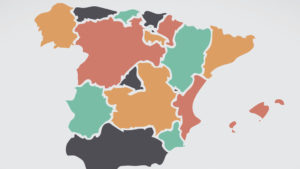Executive Summary
At Blanco Consultoría Politica we consider it very important to know the vision of those who are in charge of public management. Normally, when the administration of the municipalities is analyzed, it is done from the perspective of the citizen, seeking to know what their demands, unmet needs and others are. However, an accurate evaluation of local public efforts requires a global approach, where not only data on the demands and needs of citizens are considered, but also the possibilities and limitations that local government officials have when it comes to satisfying them. . The lack of knowledge and understanding of the context in which officials work to meet the growing demands of citizens represents one of the greatest weaknesses of the public system, since it prevents substantial improvements to be made to increase the efficiency of management.
In this work we present the results of a consultation carried out during the month of April 2021 to mayors in charge of towns with less than six thousand inhabitants of Spain, in which they express themselves on issues related to the management of their Town Councils . The objective of the consultation is to open the way towards a comprehensive approach to public problems and demonstrate the importance of the mayors' gaze to establish diagnoses and situation charts that will later help to design strategies aimed at improving management.
The results are compared with those obtained in the year 2020. An improvement can be observed in terms of expectations regarding the depopulation problem. There is an increase in the percentage that states that the situation has a solution and that in 10 years it will be better on this issue. We also incorporate a question related to the current pandemic, which allows us to identify the main concerns of mayors for the future: lack of employment, a poor health system and tourism.
Paper
During the month of April 2021, the Consultora Blanco CP conducted an opinion poll of the mayors of towns with less than 6,000 inhabitants in Spain in order to find out their views on the work they do, understand the challenges they face and identify particular characteristics of their management. The analysis was focused on municipalities with less than six thousand inhabitants because they gather a series of homogeneous variables that allow the results to be extrapolated and grouped into a category.
In the first instance, the mayors were consulted about the time it takes for them to carry out different tasks that are in their charge, ranging from the study of the problems of the city and the planning of public policies to the particular attention of neighbors. This point is extremely important because time is finite and especially for officials who often carry out another professional activity. Knowing how they distribute time, allows detecting organizational problems and proposing solutions.
Like in the year 2020, those consulted refer that they spend a lot or too much time of their working day solving daily problems, while they continue to state that direct care for neighbors takes a lot of time.
Of the three most time consuming tasks, two of them are attending to everyday problems and receiving neighbors, which reveals the existence of unsolved structural problems. In many cases, the lack of substantive solutions can be the cause of a multiplicity of complaints by citizens, to which the City Council must attend, thus dedicating most of the day to coping with the management. This can be called "survival management", where you work on a day-to-day basis due to the lack of time and resources to develop a strategic administration. The disadvantage of this type of situation, in addition to limiting the development of the town, is that it becomes impossible to resolve all demands, which leads to a decline in the quality of life experienced by residents. At the same time, frustration is generated by officials who are misunderstood by their neighbors.
Another negative aspect is the undeveloped potentiality, although it is difficult to quantify. A city that does not advance lags behind, and the gap between municipalities with enough time and resources to plan and innovate their policies and those that only survive increases year by year. Consequently, residents of nearby towns may notice a growing asymmetry in the quality of life that is experienced in each place.
An interesting fact that emerges from the survey is that the number of respondents who say they are in charge of carrying out tasks that actually correspond to other spheres of government increased. At this point it would be interesting to identify what these tasks are and study if they are repeated by area or level of government, and then design a specific solution.
The mayors were also consulted in reference to who they turn to when they have a problem to solve in their locality. The percentages remain quite similar to those of the previous year.
One fact that we are interested in highlighting is that the search for assistance by another mayor is again in fourth place, when this should be his natural ally. When facing a particular problem, it is best to receive advice from someone who solved the same problem in a similar context (population size, budget, staff limitations, etc.). In this regard, it would be convenient to create an inter-municipal assistance network, in which each municipality can link with their peers, that is, those with whom they share a number of homogeneous variables that make them compatible. In this way, when they have to find the solution to any issue, they can resort to that network, finding in it the set of City Councils that have been better able to manage that area and therefore are more qualified to advise them.
Given that local authorities have many personnel and resource limitations, it is imperative to exploit all the alternatives that can help them. That there is an articulated network between the Town Halls can provide great savings in time and resources.
In this section, the percentages remain stable with respect to the previous year, only with a modification in relation to the Federations of Municipalities that increased their consideration as a very collaborative body with the City Councils.
What is the most difficult aspect of your job?
The answers can be conceptualized and ordered by repetition in the following expressions:
2021
Bureaucracy and slow and heavy administration
Misunderstanding by citizens, lack of empathy
Lack of sources
Make professional work compatible with the mayor's job
Social problems
2020
Misunderstanding by citizens, lack of empathy
Lack of sources
Bureaucracy and slow and heavy administration
Make professional work compatible with the mayor's job
Treat topics of many different themes
That the bureaucracy has risen from third place to first is really worrying. Making a city council with a small population have the obligation to comply with administrative requirements similar to large cities that have a lot of staff to do it is not only unfair but also difficult to do. This is something easy to modify, starting from what exactly are those bureaucratic tasks that complicate management and establishing a differentiated treatment for municipalities with less than a certain number of employees. It is desirable that the different levels of the State help each other and not end up being one more problem to be solved.
Unlike the previous year, social problems emerged as a difficult aspect to face. Here we must make a deep reflection because it can be an enhancer of greater incentive to depopulation. The processes of social degradation are slow and gradual and their reversal is just as slow and gradual.
Covid 19 pandemic
Depopulation
The results of these two questions are illuminating when it comes to understanding what those who are in charge of the Town Halls think. Interestingly, there are as many people who consider that the problem of depopulation will continue its negative trend, as well as those who believe that it has a solution. This brings us to the next question.
What do you think is / are the reasons why the various proposals to solve the problem of depopulation in Spain fail?
2021
Lack of infrastructure
Job shortage
Ignorance of the reality of the peoples
High taxes
Acceso a la vivienda
Dificultad para coordinar la iniciativa privada y pública.
Notion of people associated with negative concepts (abandonment, mediocrity)
2020
Much analysis and little specification of policies
Lack of infrastructure
Little flexibility, lack of simplicity in procedures
Job shortage
High taxes
Ignorance of the reality of the peoples
Notion of people associated with negative concepts (abandonment, mediocrity)
These were the concepts most expressed, which allow a global view of the perspective that officials have on the subject. Beyond the fact that each locality has its particularity and therefore cannot be extrapolated in a linear way.
Of the responses obtained, the most striking remains the one referring to the lack of knowledge on the subject that those who design policies to solve the problem have. This leads us to reflect on the need for a more active role for mayors when it comes to thinking and proposing the measures to be taken. It would be interesting to find communication channels that make it possible to have a greater presence of those who inhabit and manage the territory in collaboration with all the actors involved today in seeking to reverse depopulation. It is evident that they do not feel heard or understood in their entirety, reversing this situation is not only simple but very important.
Conclusions
The smallest city councils in Spain face the main challenge that any city council can face and that is their own subsistence. Paradoxically, these municipalities are the ones that have the least management tools to work with, which is why it is important to help them, because as they have fewer staff they should use more management tools, instead of less.
Trapped in a maze
Growing social demands are faced with a low budget, which results in insufficient infrastructure and a multiplicity of consultations on the first level of Government. In mayors, it generates daily problems without a solution, which leads them to invest most of their time to face the situation, but since they cannot provide comprehensive solutions, daily problems accumulate, and therefore the quality of life deteriorates. , at the same time that the rulers' frustration increases. In addition, they face challenges of global discussion such as the impact of technology on the labor market and the consequent migration to large cities. What is manifested is that management must be professionalized with tools that make it possible to save efforts and have a direct impact on the community. In short, all these challenges are faced by few staff and sometimes by unpaid officials, which means little time since they must have another job.
Recommendations
Create an inter-municipal network
Group similar municipalities, determining the similarity based on a number of homogeneous variables such as: number of population, size of the territory, budget, geographical location, economic activities, infrastructure, problems, etc. Our proposal is that each City Council publishes within that network its situation regarding the different variables of the town, such as safety, health, transport, waste management, employment, education, environment, etc.
In this way, when a municipality faces a problem instead of solving it on its own, it can go to that digital network and find within the municipalities of its group who has been best able to manage that area and request advice.
Classify disadvantaged areas
It is not logical that places with such different situations have the same treatment. Being able to create a classifier of disadvantaged areas can be a way for them to stop being so. In this way, the municipalities that meet a series of characteristics, for example: constant population loss in the last five years, poor connection with other cities, lack of highly complex health services, lack of access to higher education, infrastructure deficiencies and services, etc., can request a differentiated treatment, such as: simplification of administrative procedures, tax reduction for residents, greater budget support, etc.
Treating everyone the same means unequal treatment. For an inhabitant of a town to pay taxes similar to those of a large city is unfair since the two do not receive the same services. Those who reside in a large city have easy access to highly complex healthcare, museums, higher education, connection to other cities, public services, etc. This shows a lack of motivation to stay or move to the towns, which means there is an incentive to leave the towns or not to consider them as future places of residence.
Positive association of peoples
The constant association of peoples with neglect, depopulation, and backwardness only helps make it a self-fulfilling prophecy.
Starting to present towns as a place of opportunities, highlighting their virtues and their positive differences with the big cities, is essential in order not to discourage potential residents. Likewise, strategically attending congresses to highlight the virtues of the people for the establishment of certain knowledge industries can be an empowering alternative, as well as promoting their proximity to the environment and tranquility to motivate future residents.
Job
Due to the great changes in labor dynamics and the great advancement in technology, in the last decade the number of people who carry out their work at a distance, known as “digital nomads”, has increased. These workers have the possibility of living or staying for periods of different lengths in different cities. This workforce represents a vitally important sector in places where there is no generation of employment.
The country with the largest number of statistics on this sector of the economy, and which can be taken as representative of developed countries, is the United States. According to 2014 Freelancers Union data, 30% of North American workers work remotely and it is projected that by 2035 these workers will be 50% of the labor market.
Blanco Political Consulting is registered in the Register of Opinion Polls and Surveys Companies, belonging to the National Electoral Chamber and works in strict compliance with the international codes that regulate the activity, formulated by ESOMAR, to which SAIMO (Argentine Society of Market Researchers and Opinion). This includes protocols for confidentiality, anonymity and good practices.
Data sheet
Date of completion: April 2021
Consulted: Mayors of localities with less than six thousand inhabitants in Spain.
Modality: Structured questionnaire with closed questions and open questions.
Sistema de consulta: CAWI (Computer-Assisted Web Interviewing).






